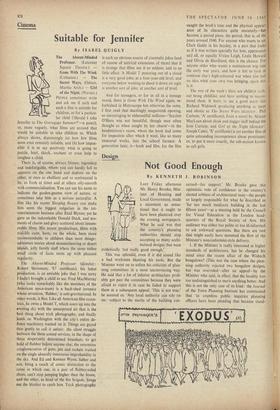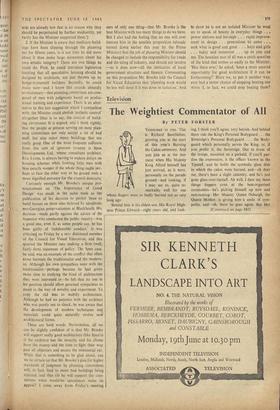Design
Not Good Enough
By KENNETH J. ROBINSON
This was splendid, even if it did sound like a bad workman blaming his tools. But the Minister went on to soften his criticism of plan-' ring committees in a most unconvincing way. He said that a lot of inferior architecture prob- ably got past the committees because they were afraid to' reject it in case he failed to support them at a subsequent appeal. 'This is not true,' he assured us. 'Any local authority can rely on me--subject to the merits of the building con- cerned—for support.' Mr. Brookc gave this optimistic vote of confidence in the country's elected arbiters of architectural taste—the people so largely responsible for what he 'described as 'far too much mediocre building in the last fifteen years'—at a meeting held by the Council for Visual Education at the London head• quarters of the Royal Society of Arts. Hi! audience was either too polite or too ill-informed to ask awkward questions. But there are twc that might easily have stemmed the flow of the Minister's nonconformist-style delivery.
1.• If the Minister is really interested in higher standards of architecture, has he changed his mind since the recent affair of the Wished bungalows? (This was the case where the plan. ning authority rejected two bungalow designs but was overruled—after an appeal—by the Minister who said, in effect, that the locality was too undistinguished to merit anything better. Anc this is not the only case of its kind: the Journa of the Town Planning Institute has commentec that 'at countless public inquiries plannint officers have been pleading that because stand ards are already low that is no reason why they should be perpetuated by further mediocrity, yet rarely has the Minister supported them.') 2. If the Minister is aware that mediocre build- ings have been slipping through the planning net for fifteen years, is it not time he did more about it than make large statements about his own artistic integrity? There are two things he could do. First, he could introduce legislation insisting that all speculative housing should be designed by architects, not just thrown up by bodge-it-yourself builders. Secondly, he could make sure—and I know this sounds absurdly revolutionary—that planning committees are com- posed of men with judgments based on profes- sional training and experience. There is an alter- native to this last suggestion which I sympathise with: the Minister could abolish 'aesthetic control' altogether (that is to say, the control of build- ing elevations). It is argued, and I think rightly, that the people at present serving on most plan- ning committees not only accept a lot of bad stuff, but also reject many buildings that are really good. One of the most frequent sufferers from this sort of ignorant tyranny is Span Developments Ltd., whose consultant architect, Eric Lyons, is always having'to endure delays on housing schemes while footling little men with blue pencils wonder if the whole thing ought per- haps to face the other way or be graced with a more dignified entrance for the council dustcarts.
Curiously enough Mr. Brooke's unique pro- nouncement on 'The Importance of Good Design' was made in the same week as the publication of his decision to permit Span to build houses on three sites beloved by apoplectic neo-Georgian preservationists at Blackheath. His decision—made partly against the advice of the inspector who conducted the public inquiry—was a good one, even if, as some people say, he has been guilty of 'indefensible conduct.' It was criticised on Friday by a very distressed member of the Council for Visual Education, and this spurred the Minister into making a firm (well, fairly firm) statement of policy. The Span case, he said, was an example of the conflict that often arose between the traditionalist and the modern- ist. Although his own sympathies were with the traditionalist—perhaps because he had given more time to studying the kind of architecture they were interested in—he felt that no one in his position should allow personal sympathies to stand in the way of novelty and experiment. To copy the old was to stultify architecture. Although he had no patience with the architect who was purely out to shock, he was aware that the development of modern techniques and materials could quite naturally evolve net architectural forms.
These are bold words. Nevertheless, all we can be slightly confident of is that Mr. Brooke will support really good architecture (like Span's) if the architect has the tenacity and his clients have the money and the time to fight their way past all objectors and secure the ministerial ear.
While that is something to be glad about, can we be certain (a) that Mr. Brooke's plea for higher standards of judgment by planning committees will, in fact, lead to more bad buildings being rejected, and that (b) he will support the com- mittees when would-be spedilators make an appeal? I came away from Friday's meeting sure of only one thing—that Mr. Brooke is the best Minister with too many things to do we have. But I also had the feeling that no one will ever interest him in the sensible proposition (already turned down earlier this year by the Prime Minister) that the job of planning Minister should be changed to include the responsibility for roads and the siting of industry, and should not involve —as it does now—all the intricacies of local government structure and finance. Commenting on this proposition Mr. Brooke told the Council for Visual Education that 'planning work would be less well done if it was done in isolation.' And to show he is not an isolated Minister he went on to speak of beauty in everyday things . power stations and tea-cups . . . rapid improve- ment in design . . . generations to come . . . seek what is good and great . . . boys and girls . . . today and tomorrow . . . up to you and me. The bonniest mot of all was a catch question of the kind that comes so easily to the Minister. 'Has there ever,' he asked, 'been a more assured opportunity for good architecture if it can be forthcoming?' Have we, to put it another way, ever had a better chance of stopping beating our wives if, in fact, we could stop beating them?











































 Previous page
Previous page